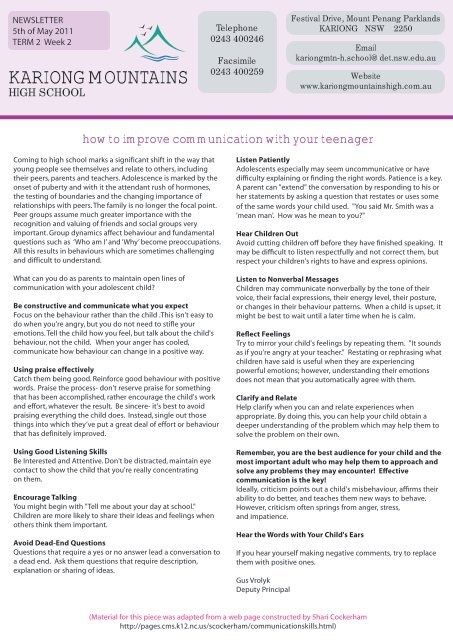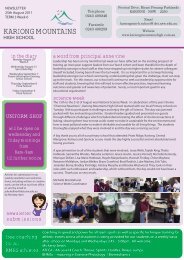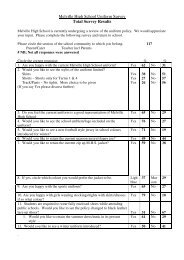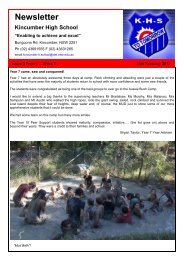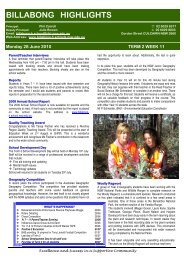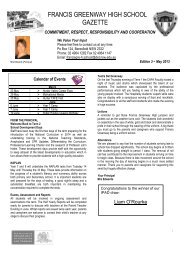Kariong Mountains High School
Kariong Mountains High School
Kariong Mountains High School
- No tags were found...
Create successful ePaper yourself
Turn your PDF publications into a flip-book with our unique Google optimized e-Paper software.
NEWSLETTER5th of May 2011TERM 2 Week 2KARIONG MOUNTAINSHIGH SCHOOLTelephone0243 400246Facsimile0243 400259Festival Drive, Mount Penang ParklandsKARIONG NSW 2250Emailkariongmtn-h.school@det.nsw.edu.auWebsitewww.kariongmountainshigh.com.auhow to improve communication with your teenagerComing to high school marks a significant shift in the way thatyoung people see themselves and relate to others, includingtheir peers, parents and teachers. Adolescence is marked by theonset of puberty and with it the attendant rush of hormones,the testing of boundaries and the changing importance ofrelationships with peers. The family is no longer the focal point.Peer groups assume much greater importance with therecognition and valuing of friends and social groups veryimportant. Group dynamics affect behaviour and fundamentalquestions such as ‘Who am I’ and ‘Why’ become preoccupations.All this results in behaviours which are sometimes challengingand difficult to understand.What can you do as parents to maintain open lines ofcommunication with your adolescent child?Be constructive and communicate what you expectFocus on the behaviour rather than the child .This isn't easy todo when you're angry, but you do not need to stifle youremotions. Tell the child how you feel, but talk about the child'sbehaviour, not the child. When your anger has cooled,communicate how behaviour can change in a positive way.Using praise effectivelyCatch them being good. Reinforce good behaviour with positivewords. Praise the process- don't reserve praise for somethingthat has been accomplished, rather encourage the child's workand effort, whatever the result. Be sincere- it's best to avoidpraising everything the child does. Instead, single out thosethings into which they’ve put a great deal of effort or behaviourthat has definitely improved.Using Good Listening SkillsBe Interested and Attentive. Don't be distracted, maintain eyecontact to show the child that you're really concentratingon them.Encourage TalkingYou might begin with "Tell me about your day at school."Children are more likely to share their ideas and feelings whenothers think them important.Avoid Dead-End QuestionsQuestions that require a yes or no answer lead a conversation toa dead end. Ask them questions that require description,explanation or sharing of ideas.Listen PatientlyAdolescents especially may seem uncommunicative or havedifficulty explaining or finding the right words. Patience is a key.A parent can "extend" the conversation by responding to his orher statements by asking a question that restates or uses someof the same words your child used. "You said Mr. Smith was a'mean man'. How was he mean to you?"Hear Children OutAvoid cutting children off before they have finished speaking. Itmay be difficult to listen respectfully and not correct them, butrespect your children's rights to have and express opinions.Listen to Nonverbal MessagesChildren may communicate nonverbally by the tone of theirvoice, their facial expressions, their energy level, their posture,or changes in their behaviour patterns. When a child is upset, itmight be best to wait until a later time when he is calm.Reflect FeelingsTry to mirror your child's feelings by repeating them. "It soundsas if you're angry at your teacher." Restating or rephrasing whatchildren have said is useful when they are experiencingpowerful emotions; however, understanding their emotionsdoes not mean that you automatically agree with them.Clarify and RelateHelp clarify when you can and relate experiences whenappropriate. By doing this, you can help your child obtain adeeper understanding of the problem which may help them tosolve the problem on their own.Remember, you are the best audience for your child and themost important adult who may help them to approach andsolve any problems they may encounter! Effectivecommunication is the key!Ideally, criticism points out a child's misbehaviour, affirms theirability to do better, and teaches them new ways to behave.However, criticism often springs from anger, stress,and impatience.Hear the Words with Your Child's EarsIf you hear yourself making negative comments, try to replacethem with positive ones.Gus VrolykDeputy Principal(Material for this piece was adapted from a web page constructed by Shari Cockerhamhttp://pages.cms.k12.nc.us/scockerham/communicationskills.html)


